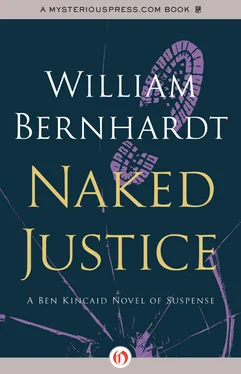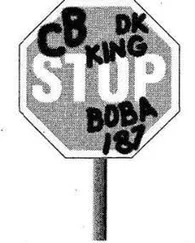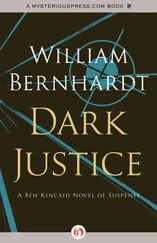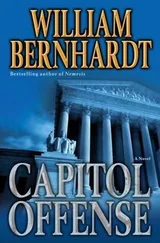“I know. I’ve been trying to get the council to approve a twenty percent wage increase for them for three years.”
The officers on either side of him studiously scrutinized their shoes. It was true; they all knew it.
Ben took Barrett by the arm and led him into the courtroom, sheriff’s men close at his heels. The instant they entered the courtroom, they were met by a loud, enthusiastic response—all of it negative. The courtroom was packed, no surprise, and with the exception of the press, everyone in the room appeared to be hissing and booing and snarling at their mayor, now the disreputable-looking defendant in the ugly orange garb. There were a few shouts from the far corner, a few loud calls for impeachment, a few racist slurs.
“Ignore it,” Ben commanded sotto voce. “Face forward. Don’t give them the satisfaction of responding.”
Barrett nodded his understanding.
Unfortunately, the judge was not yet in the courtroom, so there was no immediate demand for order in the court. They would just have to ride it out.
Jack Bullock was at the prosecution table, emptying his briefcase studiously. Ben wasn’t surprised; he had anticipated that Bullock would want to handle this one. Ben caught Bullock’s eye for a glimmer of a second; Bullock looked quickly away.
Too bad. Ben had known Bullock since he was in law school, back when he had interned at the DA’s office in Oklahoma City. They had worked together back then, two minds with a single idealistic goal: making the world a better place. But since they had both moved to Tulsa, and Ben had become known (to the extent he was known at all) principally as a defense lawyer, Bullock had refused to have anything to do with him. He had made it abundantly clear that he considered Ben a “disappointment,” a defector from the cause of the good and the righteous.
Ben considered forcing himself on the man, but decided against it. He needed to focus on his client, and how he could best use this arraignment to his client’s advantage. He couldn’t get all caught up in his emotions about his former mentor.
A few moments later, the court bailiff instructed everyone to rise and the door opened on the Honorable Edwin H. Hawkins, affectionately known as Hang ’em High Hawkins. Hawkins, as Ben knew all too well, envisioned himself as a modern-day Judge Roy Bean, a hanging judge for the Nineties. The only good thing Ben could say about Hawkins handling the arraignment was that it guaranteed he wouldn’t be handling the inevitable trial.
Judge Hawkins ran briskly through his preliminaries, doing his best to cut the fine figure of a judge. Unlike his usual slouched, rather cynical demeanor, today he was sitting up straight, enunciating clearly, projecting his voice, and basically conducting himself in a dignified manner. Ben realized Hawkins had been tipped off to the fact that several rows of the gallery were filled with reporters, probably more press than he had seen in his courtroom for all his previous cases combined.
The bailiff called the case, and Hawkins asked Ben if his client would waive the formal reading of the charge. He did. This was all procedural rigmarole. Although required by the state constitution, the reading of the arraignment, usually long and cluttered with difficult to comprehend legalese, only slowed things down.
Judge Hawkins now peered down at the defendant. “Mr. Barrett, you have been charged with three separate counts of first-degree murder. Do you understand the charges that have been made against you?”
“I do,” Barrett answered in his usual deep baritone, like James Earl Jones with a head cold. Ben could answer for his client and usually did, but Barrett had told him beforehand that he could and would answer for himself. He was also apparently not unaware that there were reporters in the gallery.
“And have you been advised of your rights as the accused?”
“I have.”
“And have you had an opportunity to consult with counsel with regard to the charges that have been made against you?”
“I have.”
Hawkins lifted the papers on his desk and bounced them into a neat stack. “Very well, sir. How do you plead against these charges?”
“I plead not guilty,” Barrett said emphatically. And then after a moment he added, “I didn’t do it.”
There was an audible sound from the gallery, not a buzz, but certainly a distinctive murmur. The sound of many pencils in motion.
Hawkins stared down at the defendant, his lips slightly parted. “You plead not guilty?”
“I do, sir.”
The model of professionalism, Hawkins lowered his head and scribbled on his legal pad. He obviously wanted to say something, but was too smart to say it here and now.
“Got anything more to say?” the judge asked.
“I’m sick at heart about this, judge.” Barrett’s face was firm but earnest. “We must catch whoever committed this horrible crime. It wasn’t me, but the police aren’t looking for anyone else. I’m specifically asking this court to use its influence to order the police department to continue its investigation.”
“I’m afraid that’s outside my jurisdiction.” The judge shuffled a few more papers, then turned to Bullock, standing just to the side of the defendant. “Mr. Prosecutor, when can you be ready for trial?”
“As soon as your honor wishes,” he replied crisply.
“The prosecution is ready?”
“Completely.”
“You’ve got all the evidence you need?”
A faint smile played on Bullock’s lips. “Hasn’t everyone?”
Hawkins quickly lowered his head, to conceal, Ben suspected, the faint smile now playing on his own lips. When his head rose again, he had reapplied his poker face. “Very well. The court will set the preliminary hearing for Thursday at nine o’clock. The defendant is committed to the care of the county sheriff’s—”
“About that, your honor,” Ben said. He hated to interrupt, but he also knew that after a judge had made a ruling, it was almost impossible to get him to reverse it. “We move that the defendant be released on bail pending the hearing or trial. We’re willing to post any reasonable amount.”
“The state objects in the strongest possible way,” Bullock said. “The defendant has been charged with three counts of capital murder.”
“Nonetheless,” Ben said, “Mr. Barrett is one of the leading citizens in our community—”
“Was,” Bullock interjected.
“Mr. Barrett is one of the best-known individuals in this city. In this state, for that matter. He could hardly just disappear.”
“Your honor,” Bullock said, in his usual calm but insistent voice, “the defendant has already tried to flee once. Surely we are not going to give him another opportunity.”
“That’s not fair or accurate—”
Hawkins waved Ben quiet. “The court agrees with the prosecutor, counsel. These charges are so serious, so”—he paused, apparently searching for a word that would convey his meaning without suggesting that he had lost his neutrality—“so profoundly disturbing that bail could be denied on those grounds alone. Moreover, the defendant has demonstrated a clear disposition for flight. I believe I have no choice but to deny bail. The defendant is remanded to the custody of the county sheriff until further notice.”
He pounded his gavel for emphasis. “If there is nothing more, I’ll see you gentlemen on Thursday. By the way, I’ve granted approval to Court TV to televise the hearing and, pending approval of the judge assigned to the case, the trial. Other networks will have equal access to the footage, as will you.”
“Your honor,” Ben said, “I object—”
Barrett tugged on Ben’s arm. “No, it’s all right.”
Ben lowered his voice. “Wallace, I don’t think this is a good idea.”
Читать дальше







